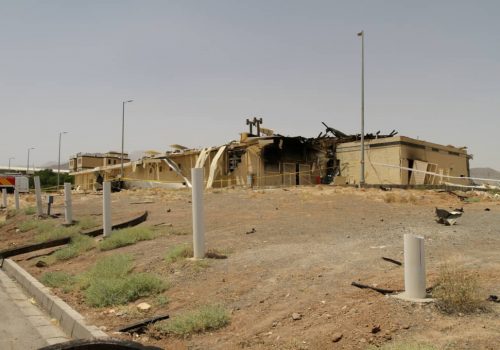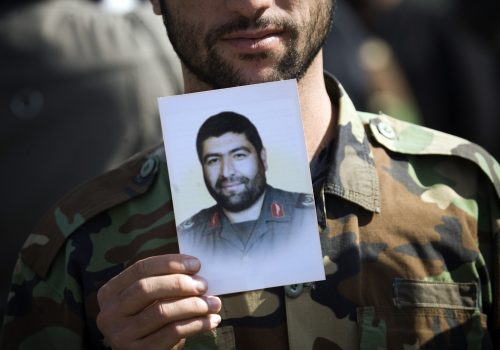Iranian reformists decry the assassination of a leading nuclear scientist
The assassination of Iranian nuclear scientist Mohsen Fakhrizadeh on November 27 has provoked a variety of reactions from Iranians inside and outside the country, including a surprisingly robust nationalist response from reformists who themselves have faced government repression.
Iranian officials believe that Israel is behind the attack. Iran’s state-owned English news network Press TV reported that a weapon found at the location of the attack bore “the logo and specifications of the Israeli military industry.” The assassination sent shockwaves throughout the country, following the death of Quds Force commander Qassem Soleimani who was killed in January by a US drone strike in Iraq. Many Iranians fear that these covert operations could lead to an all-out military confrontation with Israel and the United States before President Donald Trump leaves office.
In response to the assassination, on December 2, parliament voted to increase the level of Iran’s uranium enrichment to a provocative 20 percent unless the incoming Joe Biden administration returns promptly to the Iran nuclear deal and lifts punishing sanctions.
Hard-line protestors demonstrated outside of President Hassan Rouhani’s office, demanding that Rouhani make no concessions to Washington. Other prominent leaders, such as chief of staff of the armed forces Brigadier General Mohammad Bagheri, vowed to avenge the killing.
Former Vice President Mohammad Ali Abtahi brought attention to a “security hole” that has enabled Israel to infiltrate Iran and carry out a series of attacks, including the sabotage of Iranian nuclear facilities.
Much as the killing of Soleimani in January initially seemed to unify Iranians against foreign aggression, the spectacular death of Fakhrizadeh elicited outrage from Iranian reformists and civil society activists, who have themselves been the target of official repression. Reformist and activist Abdollah Momeni published a statement on his Twitter account signed by hundreds of other reformist activists that condemned the killing and called on the Iranian government to strengthen its national defense, intelligence, and security capabilities. Momeni was sentenced to five years in prison for protesting the disputed presidential elections of 2009.
The signatories strongly condemned Fakhrizadeh’s assassination and sent condolences to his family and the people of Iran. The group stated that it stood with all Iranians in mourning the assassination of a patriot and called Fakhrizadeh a martyr.
The statement asserted that there is considerable evidence that the Israeli government was behind the attack and called the assassination a clear example of state terrorism. It added that the killing took place in the last weeks of the Trump administration, after the failure of Trump’s “maximum pressure campaign” that attempted to “ignite the flames of war and weaken Iran.” It said that wise and firm action by the Islamic Republic can and must stop warlords and terrorists from achieving their goals.
The statement urged the Iranian government to:*
- Strengthen its deterrence and the capability of its national defense.
- Improve the resistance of intelligence and security institutions against foreign subversion.
- Establish more effective protection of the country’s scientists, human capital, and vital facilities.
- Use diplomacy to design a successful global campaign and mobilize public opinion against Israeli state terrorism and the Israeli nuclear program.
Among the signatories are reformists who have themselves faced arrest and repression at the hands of the security services. They consist of politicians Mohsen Armin, Mohammad Reza Khatami (the brother of former president Mohammad Khatami), Tehran mayor Morteza Alwiri, and former Tehran city council members Shahrbanoo Emami and Hojat Sharifi. The letter was also signed by several former members of parliament, including Ahmad Shirzad, representative of Esfahan and Mahmoud Sadeghi, representative of Tehran.
The move is significant because this is the first time in several years that so many reformists have rallied behind the regime. It shows that there is a strong nationalist voice inside the country that transcends political factionalism. The letter demonstrates a “rally around the flag effect” in response to foreign attack and a recognition that the country is in a time of crisis caused by sanctions, sabotage, and the coronavirus pandemic.
Other reformists who signed the letter include Masoud Bastani and Behzad Nabavi, a former deputy parliament speaker who served a six-year term in prison for protesting the disputed re-election of President Mahmoud Ahmadinejad. Having several former prisoners’ names on the letter made it more compelling. The signatories suggested that the violation of their country’s sovereignty and security was so egregious that they had to voice their support to the same government that jailed them for protesting. Furthermore, many members of parliament who were not allowed to run for re-election by the Guardian Council for the February elections also supported beefing up Iran’s national defense and security.
Reformists are showing that they believe Iran’s security establishment has focused on the wrong targets, going after patriotic Iranians rather than foreign enemies. In response to the letter, the Atlantic Council’s Barbara Slavin stated that “it’s important that Iranian reformists, including those in exile, are consistent in their opposition to extrajudicial killings.”
Iranian human rights advocate Emadeddin Baghi also called for one standard on human rights. In a tweet, he wrote, “Let us not forget that Israel’s greatest function during its sixty-eight-year lifetime has been to justify terrorism.” He also mentioned a prior Israeli assassination of a Palestinian professor in 1986 and claimed that terrorism is the foundation of the Israeli intelligence system.
The assassination of Fakhrizadeh has caused reformists to rally behind their government in a way not seen for several years. This solidarity comes from their rejection of such killings and long-time opposition to Israel, as well as their desire to become relevant in Iranian politics again. If it is true that Israel carried out this assassination, they have created an unintended consequence: the unification of all Iranian political factions against Israel and extra-judicial killings.
*NOTE: MIAAN translated the Persian statement into English.
Sydney Martin is an intern with the Atlantic Council’s Middle East Programs. Follow him on Twitter: @Sydney_Mar10.
Image: A protester holds a picture of Mohsen Fakhrizadeh, Iran's top nuclear scientist, during a demonstration against his killing in Tehran, Iran, November 28, 2020. Majid Asgaripour/WANA (West Asia News Agency) via REUTERS


